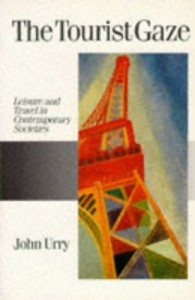The Tourist Gaze: Leisure and Travel in Contemporary Societies (Theory, Culture and Society Series)
 In Michel Foucault’s sense of the word “gaze,” knowledge is paramount. The gazer—all-seeing, all-knowing—quickly penetrates depths and layers to perceive a subject’s essence. In the last paragraph of his book, John Urry referes to Foucault’s gaze and its relation to travel and tourism:
In Michel Foucault’s sense of the word “gaze,” knowledge is paramount. The gazer—all-seeing, all-knowing—quickly penetrates depths and layers to perceive a subject’s essence. In the last paragraph of his book, John Urry referes to Foucault’s gaze and its relation to travel and tourism:But what now is happening, as tourism develops into the largest industry worldwide … [is that:] almost all spaces, history and social activities can be materially and symbolically remade for the endlessly devouring gaze … To return to Foucault, contemporary societies are developing less on the basis of surveillance and the normalization of individuals, and more on the basis of the democratization of the tourist gaze and the spectacleisation of place. (156)
Although John Urry refers to Foucault briefly in both the beginning and ending of his book, The Tourist Gaze, Urry is not using the term gaze in precisely the same sense as Foucault. As Urry explains, the tourist’s gaze, though ostensibly quite different from the medical gaze Foucault describes, is just “as socially organized and systematised as is the gaze of the medic” (1). Nevertheless, a major difference exists between the knowledgeable, totalizing gaze of a physician Foucault describes and the variety of gazes a tourist deploys. In terms of reception, the physician’s gaze is respected; by implication the tourist’s gaze is that of an amateur.
In devoting an entire book to analyzing the tourist’s fairly shallow gaze, Urry creates an implicit dichotomy. If the tourist’s gaze is marked by superficiality, kitsch, and inauthenticity then surely there must exist “something else,” a gaze that would somehow be different from that of a tourist. Commonly, distinctions are drawn between a tourist (the gauche novice) and the traveler (the knowing connoisseur).
In many ways, the tourist is the modern-day version of Mary Louise Pratt’s colonialist travelers who presume to “acquire” the countries they visit via their “imperial eyes.” In one ironic passage Pratt explains the motivation of a particular set of imperialist travelers who epitomized condescending discourse: “No one was better at the monarch-of-all-I-survey scene than the string of British explorers who spent the 1860s looking for the source of the Nile … [these:] Victorians opted for a brand of verbal painting whose highest calling was to produce for the home audience the peak moments which geographical ‘discoveries’ were ‘won’ for England” (202). These Victorian travelers who wrote about exotic landscapes and adventures for the armchair travelers’ consumption, prefigure the “pilgrims” Mark Twain lampoons in Innocents Abroad, the “ugly American” that figured in the mid-twentieth century literature and film, and the weary tourists satirized such movies as If It’s Tuesday, This Must Be Belgium.
Urry dates the advent of mass tourism to the beginning of the twentieth century when—for the first time—people other than just the upper classes of modern society were able to travel. Though Urry does comment, that with the breakdown of boundaries characteristic of postmodernism “people are much of the time ‘tourists’ whether they like it or not” (83) the distinction (and the stigma) nevertheless persists.
from a prior publication




